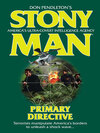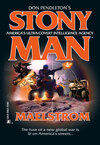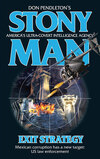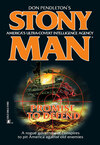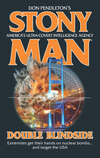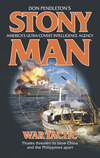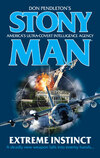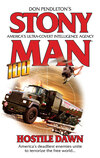Kitabı oku: «Primary Directive», sayfa 4
“Maybe they’re planning to move the personnel,” Hawkins offered.
“What do you mean?”
The Southerner waved his arm for emphasis. “They have an operation they have to get off the ground soon. Something big and bold, maybe something nobody would even think about. We’ve all agreed they obviously need a certain capacity of bodies to complete this mission, otherwise they wouldn’t have gone to all this trouble to start with. Keep in mind they’ve probably been funneling personnel into the U.S. for months. But if they’re smuggling them in through Panama, they have to get them from one point to the next.”
“He’s right,” James said, picking up Hawkins’s train of thought. “And the only way to do that is to utilize a network already established.”
“Of course,” Encizo said. “It all makes sense now. We know they used the immigration problem to get their people into the United States, so why not funnel personnel through the Central American drug corridor.” He looked at McCarter and added, “Drug dealers are more than happy to enter into any transactions that help fund their operations, and they aren’t too particular about who they work with as long as the other side’s paying cash.”
“So you think they’re running this human pipeline up through Central America via the powder trail,” McCarter said.
All of the men nodded their agreement and the Phoenix Force leader had to admit they were onto something. Their theory didn’t explain everything, but it did happen to fill a lot of the holes. Maybe their prisoner had this information, maybe he just knew the route. Whatever the case, it was their first and best place to start.
“Okay,” McCarter said. “If there are no other suggestions, we go with this and see where it leads us.”
“Great,” Hawkins chimed in. “But where do we start?”
A rap came at their apartment door and Encizo opened it to admit Robert Nativida. The interior secretary greeted each of them with a somber expression. Obviously he’d been in touch with his superiors, and they weren’t happy with the incident that had occurred earlier in the day.
Nativida cleared his throat and walked straight to Manning. As he extended his hand, he said, “I am obliged to apologize for my…indiscretion, sir. I hope you will excuse the behavior.”
Manning looked at the others in surprise and then shook Nativida’s hand. “No hard feelings.”
Nativida nodded, then turned to McCarter. “My government wishes to extend its thanks for your assistance today. We have confirmed only the terrorists suffered casualties. All our people are safely accounted for and as such you are to be commended. I have been instructed to cooperate fully with you and to satisfy any request you may have.”
McCarter smiled and then rose to stand in front of Nativida. “If it’s all the same to you, we’ll pass on the medals. But there is something I think you can help us with.”
“And what might that be?”
“Tell us about your drug-running problem.”
CHAPTER SEVEN
The first thing Able Team decided to do was to gather the scientists and other key personnel involved with End Zone into a secure location. The al Qaeda terrorists would consider the best chance of success lay in their ability to kill the designers and builders of the system. That meant Able Team had to act quickly to ensure their safety, and getting them out of Albuquerque and ensconced in a controlled, inconspicuous location.
Government officials tried to discourage Able Team from taking the scientists away from the labs, citing their security as some of the best of the country.
“I have no doubt about your security capabilities,” Lyons said. “But this isn’t a matter of keeping out your average bad guys. We’re talking about terrorists, and unless your people took some kind of intensive training I don’t know about, you’re not equipped to keep out al Qaeda operatives who are bent on killing these people.”
Ultimately they were forced to acquiesce when a call from the Oval Office made it clear they were to cooperate fully.
Two unmarked sedans with a detail of U.S. marshals took point and rear positions, with Able Team’s SUV and one with the scientists wedged between them. Stony Man had arranged for a safe house for the scientists at Elephant Butte—a reservoir fed by the Rio Grande tributary—just north of the tourist town of Truth or Consequences. The safe house, actually a cabin surrounded by woods, would provide a quiet place where the scientists could continue their work but provide an adequate defense posture.
The biggest concern on Lyons’s mind was the transit time. He would have preferred someplace closer but ultimately they decided the transfer was worth the risk, and it wasn’t likely the terrorists would know about the move.
Midway between Socorro and Truth or Consequences Lyons noticed the large semitruck as it merged onto Interstate 25 from Highway 107. The truck driver had seen the sedan as it passed to his right. The marshal at the wheel got smart and signaled a lane change, the SUV driver following his lead.
The semitruck driver either didn’t see the SUV filled with scientists or he didn’t care, because he swung onto the highway and immediately matched their speed as he cut into the far-left lane. The driver had to jam on his brakes to avoid being sideswiped.
“This is it!” Lyons announced. The Able Team leader watched as the SUV driver did the natural thing and slowed, then swerved into the right-hand lane and onto the shoulder. “Tell him to keep going!”
Blancanales got on the shortwave and gave the driver the instructions while Lyons waved at him to get alongside the semitruck. They passed the accelerating SUV on its left, then swung into the right-hand lane and closed on the rear tail of the semitrailer. Up ahead, Lyons saw smoke from tires locked up against pavement as the driver slammed his tractor-trailer into the rear of the point vehicle. By what could only be good training, the U.S. marshal at the wheel got his sedan under control by executing a power slide that took him off the road and onto the right shoulder, his nose now facing oncoming traffic.
Without hesitation Lyons rolled down his window and took aim at the rearmost wheels, triggering his Atchisson autoshotgun twice. The pellets easily penetrated the tires and produced an instant blowout from which the truck driver would never quite recover. The guy overcorrected in his steering and with a pop from the Jake-brake, the semitruck jackknifed and left the roadway with a screech of rubber on pavement.
Blancanales brought the SUV to a rocking halt on the shoulder of the road, and Lyons burst from the vehicle. He reached the side of the semitrailer in less than ten seconds, approaching from the driver’s side. The Able Team leader knelt and raised the Atchisson to his shoulder. The driver’s door opened and a young, Arab-looking male dropped from the tractor-trailer with an AKSU machine pistol in his hands. He never got a chance to use it. Lyons squeezed the trigger and delivered a blast that blew off the terrorist’s lower leg at the knee. The AKSU flew from the terrorist’s fingers and skittered off the shoulder into a steep ditch.
Blancanales went EVA in time to see a terrorist drop from the passenger side just as one of the escort sedans ground to a stop in the middle of the outside lane. Four agents leaped out, pistols in the hands of three, while a fourth toted a short-barreled Remington 870 shotgun. Blancanales saw the automatic rifle in the terrorist’s hands before the marshals did, but his shouted warning came a moment too late. The terrorist leveled an Israeli-made Galil and triggered a sustained burst. The two marshals who had occupied the front seats fell immediately under the onslaught of 7.62 mm lead.
Blancanales whipped out his P-239 and drilled the terrorist with a double tap.
A torrent of autofire buzzed past his head, a few striking the SUV with a metallic clang. The Able Team warrior turned in surprise to see a panel van parked on the inside shoulder of the divided highway, half a dozen terrorists firing on him and the marshals. Blancanales turned and dived inside the SUV, crawling over the console and rolling out the passenger door in a moment of self-preservation. He looked over just in time to see Lyons jump into the cab of the tractor-trailer.
What the hell was he doing? Didn’t he realize they had come under fire? Then Blancanales heard the engine roar to life and he grinned.
C ARL L YONS SLAPPED the wheel of the semitruck in victory as the engine roared to life. He took in the shift pattern diagram at a glance, then dropped the pneumatic-assisted shift lever into Reverse and engaged the accelerator as he used the vertical steering handle to whip the wheel in the opposite direction he wanted to move the trailer. The tractor-trailer lurched into life. Lyons alternated between his rearview mirrors as he moved the trailer into position between the terrorists in the grassy divider and their SUV. Lyons mused how kind it had been of the terrorists to provide such a barricade.
As he heard the rounds begin to strike the back of the trailer another idea popped into his mind. Lyons continued spinning the wheel hard to the left until he could see the terrorist’s panel van appear in his driver-side mirror. Then he moved in the opposite direction and poured on the speed. A moment later he was rewarded with the sound of metal crunching metal as he backed the trailer down the shallow embankment of the divider and directly into the front fender of the panel van. The trailer continued backward until it rode over the hood of the van’s front pickup chassis and crashed into the A-post, effectively crushing the cab of the vehicle.
Lyons leaped from the cab and yelled at the remaining U.S. marshals to get in their vehicle and get out of there. The men complied, and Lyons then called into the lapel microphone of the radio that the team should continue to the safe house. Idiots. Instead of doing their job—protecting the scientists and seeing them safely from points A to B—they were out here with what amounted to popguns trading shots with a crew of hardened al Qaeda terrorists armed to the teeth with automatic weapons.
Lyons stood by as the pair of sedans blasted down the right lane under cover of the semitrailer while Blancanales kept heads down with a barrage of rounds from his pistol. Once they were safely clear, Lyons joined Blancanales behind the cover of the SUV, trading his Atchisson Assault 12 with an M-16/M-203 combo from the floor of the backseat. He passed an M-16 assault rifle to Blancanales.
Lyons reached into the satchel on the seat, withdrew a 40 mm high-explosive grenade and loaded the launcher. Through clenched teeth he told Blancanales, “Time for thunder.”
The Able Team leader flipped the leaf-sight into play, moved to the front of the SUV and broke cover by steadying the weapon on the hood. He acquired a point beneath the semitruck trailer where it met the panel van. The weapon kicked his shoulder, the grenade hitting ground zero and detonating a heartbeat later. Half the terrorists were unable to escape the unexpected delivery of high-explosive charges. Red-orange flames and thick, oily smoke kicked into the sky as the gasoline fumes from the panel-van engine ignited. The intense heat melted tires to pavement as well as flesh from bone.
The three terrorists who managed to escape decided that charging the fortified position of their opponents seemed like a safer strategy than waiting to be incinerated behind inadequate cover. Lyons and Blancanales dispatched the terrorists with unerring marksmanship.
The echo of reports died away and left only a thunderous silence in Lyons’s ringing ears. Neither man left his position for several minutes, although to the combat-weary pair it seemed like an hour. Finally, Lyons twirled his finger to signal his belief they were clear. The pair rose and Blancanales checked the three dead terrorists on the highway for identification while Lyons frisked the pair that had manned the semitruck.
“Nothing. No big surprise there,” Blancanales remarked.
“This also means al Qaeda has someone inside the government’s security net,” Lyons stated.
“We’d better let Hal and friends know as soon as possible.”
“And Gadgets.”
“N O , I UNDERSTAND ,” Hermann Schwarz said. “I’ll keep my eyes open. See you soon.”
Schwarz hung up the phone and sighed, then leaned back in his chair and rubbed his eyes. His backside hurt, his muscles ached and his stomach growled for attention. The Able Team computer wizard looked at the thick, orange curtains as they bobbed in the breeze of the air-conditioning unit vents mounted into the wall below the window.
At some point it had grown dark outside. He climbed from his chair with a groan and went to the refrigerator of the hotel room they had set up for him about a mile off post. He didn’t like being here alone—especially not with his friends in the heat of the action without him—but Stony Man had decided it was better if he kept to himself for the time being. The unit members out of Fort Bliss assigned to work on End Zone were as vulnerable to attack from al Qaeda as the system creators, and they couldn’t afford to lose such a valuable member of the team. Schwarz remained a critical component in this operation given his familiarity with the system coupled with his expertise in electronic surveillance.
Schwarz removed some cold cuts and bread acquired from a nearby deli and went about the task of making a hoagie. After his lunch he got back to business. The system modifications had proved more difficult than he originally assessed but finally the algorithms were complete and he had transmitted them to Kurtzman. It was now basically in the hands of the Farm’s cybernetics experts to complete the original interface. That’s where the real expertise would come in. Schwarz didn’t try to be self-effacing about his abilities but he was generally a hardware man; Kurtzman, Carmen Delahunt, Akira Tokaido and Huntington Wethers were the main players in Stony Man’s technological arsenal, and a hell of an arsenal it was.
Schwarz added some notes to the schematics he’d been studying, then looked at his watch for the fourth time in an hour.
“Come on, Bear,” he muttered. “Call me back.” The harsh ring of the landline startled him and he studied the phone a second before picking it up. “Were your ears burning?”
“What’s that?” Kurtzman replied, although he caught the reference. “Sorry, it took a little more time than I thought.”
“Understood.”
“You got the call from Ironman?”
“Yeah,” Schwarz replied. “Just hung up maybe twenty minutes ago.”
“Barb told me you should be extra careful,” Kurtzman said.
“Tell Mommy I’m fine. Really.”
Kurtzman paused for effect. “Maybe I’ll leave you to tell her that.”
“Chicken.”
“No, smart.”
Schwarz chuckled. “Okay, so give me the scoop.”
“All right, we ran your computations through our database. I also had Akira program some additional software algorithms into the graphics-rendering engine, so that should help you with the analysis part.
“Your idea to mount the tracking domes to the sides and top of that van and run them from a multibattery-supplied power unit’s brilliant. You can then pipe the wireless signal back to us as you follow the designated route and we’ll get that data into the system pronto.”
“How long do you think it will take us to pinpoint their base of operations?”
“Well, if our logistical calculations are correct about what’s a practical geographic boundary for al Qaeda to operate in, I’d be willing to say we can find them within a two-mile square radius in less than eight hours.”
Schwarz whistled his amazement. “Not bad at all, Bear!”
“We aim to please.”
“What about the operation itself? You guys got any further developments on that?”
“Barb’s still running down possible angles that could give us a better idea of Bari’s movements over the past few months, but you already know we’re not sure how soon that will develop some tangible leads, if ever. She did want me to tell you we think he left Washington, D.C., by private transportation headed for Chicago where he then got on the train for Albuquerque.”
“So there’s little doubt he’s heading up this operation.”
“Right.”
“Okay then.” Schwarz sighed. “I’ll get my equipment gathered up and get it transferred to the van. Then I guess it’s wait on Ironman and Pol.”
“When are they scheduled to be there?”
“Ironman said he thought shortly after midnight.”
“Well, you just watch it until then.”
“Okay,” Schwarz replied. “Oh…and, Bear?”
“Yeah?”
“Tell Barb and Hal—No, check that. Ask them to get rid of the watch detail parked outside my motel. I’m sure they’re attracting more attention than helping and I don’t really need a babysitter.”
“I’ll pass the word but I can’t promise they’ll do it.”
“Understood, and thanks. Out, here.”
Schwarz disconnected the call and stared at the phone for a minute. An old clock on the wall ticked through the seconds—loud and annoying in the silence of the room. Schwarz reached his arms overhead, stretched and yawned, then closed the lid on his laptop and disconnected the cord attached to the unit power adapter from the wall socket.
He stood and pulled back the edge of the curtain to check on the two federal agents in the unmarked sedan he’d spotted parked there on his arrival early that afternoon. He didn’t know which agency they were with. NSA? U.S. Marshals Service? Military Intelligence? The sedan sat in the same place, but Schwarz couldn’t see the faces of the occupants because they were beneath a streetlight and the light reflected off the windshield. He let the curtain fall back and returned his attention to his laptop.
Schwarz lifted the computer from the table and then froze. Two trained agents who were assigned to a protection detail would never park their sedan under a streetlight. It would give any enemy observers the advantage because they could see the target was under observation and come up with some alternate plan, not to mention the fact it put the agents at risk.
Schwarz dropped the laptop and rushed to the front door. It swung inward with swift and violent force, and the edge caught Schwarz unawares in the shoulder. He bounced off it like a tennis ball. The Able Team warrior staggered backward but training took over and he rolled onto his back and kicked his right leg over his left shoulder as he tucked chin to chest. He continued through the backroll and came upright on one knee as four al Qaeda thugs charged through the doorway.
CHAPTER EIGHT
Schwarz didn’t have time to go for his Beretta 92-F in shoulder leather.
Fortunately, the first terrorist in line offered up his own weapon, an Italian-made Spectre submachine gun. The guy leveled the SMG at the Able Team warrior’s head, but he came a little too close in the effort. Schwarz grabbed the weapon and yanked downward as he sprang to his feet. With the terrorist off balance, Schwarz changed the direction and swung the man in a circle so that they now faced the man’s three comrades. The electronics wizard jammed his right thumb against the terrorist’s trigger finger and sprayed the unprepared trio with a swarm of 9 mm Parabellum rounds.
The first terrorist took a burst that left bright splotches of red across his chest. The man staggered backward and crashed into his partner in the confines of the small motel room. As the second terrorist attempted to disentangle from his deceased comrade, Schwarz caught the remaining gunner with a fusillade of rounds that stitched the terrorist from crotch to throat. The man danced backward, spun into the wall and then collapsed onto the bed. As he slid off the edge, he left a gory puddle of blood soaking into the cheap quilt.
Still gripping the Spectre, Schwarz stomped a heel onto the instep of his opponent’s foot with enough force to crack bones. The terrorist roared in pain and released his hold on the SMG. Schwarz whipped an elbow into the man’s temple as he yanked the Spectre free and then drove the metal stock of the weapon backward to break the terrorist’s nose. The Able Team warrior then grabbed the back of the terrorist’s collar and yanked him backward as he swept the man’s injured leg. The terrorist landed with a loud thud on the threadbare carpet.
The last terrorist had finally broken free of his partner and was bringing a semiautomatic pistol to bear. Schwarz beat him by milliseconds with the Spectre and triggered a short burst that punched holes through his adversary’s stomach and chest. The impact lifted him off his feet and tossed him into a chair.
Schwarz panned the room as the sounds of battle died out, but he wasn’t presented with any further threats. The Able Team warrior checked the terrorist lying at his feet, verified he was unconscious and then rushed out to the sedan where the two Feds had been watching him. He found both bodies in the front seat, covered in blood streaming from neck wounds where they had been garroted. Schwarz whispered a silent eulogy for the pair and then returned to the motel room. The terrorist he’d battered had just begun to regain consciousness, so Schwarz hauled him up by his shirt and slammed the guy into the other unoccupied chair.
“Wake up, sleeping beauty,” Schwarz said. “You have questions to answer.”
C ARL L YONS STUDIED the terrorist seated in front of him with an expression that said he’d like nothing better than to take the man apart limb by limb. They had faxed their prisoner’s prints and photograph to Stony Man and were waiting to see if Kurtzman could come back with some sort of identification. In the meantime, the man had refused to answer any questions—he also tried to make them believe he only spoke Spanish—demanding that they provide him with an attorney.
“You can kill the Mexican immigrant routine,” Blancanales told him in Spanish. “We know you’re with al Qaeda and we know what you’re up to. You’re not doing yourself any favors by refusing to cooperate.”
“Yeah,” Lyons added. The Able Team leader spun one of the metal chairs and dropped into it. He folded his muscular arms over the back of the chair, pinning the terrorist with one of his cold stares. “And don’t even think about asking for an attorney again or I’ll punch your teeth down the back of your throat.”
The door to the interrogation room opened. Blancanales and Lyons looked up to see Schwarz poke his head through the doorway and beckon them outside. Lyons gave the terrorist one last hard look before they joined Schwarz in the adjoining hallway of the El Paso Intelligence Center. EPIC was located at Biggs Army Air Field and run by a conglomerate of U.S. law-enforcement agencies, including Homeland Security, Border Patrol and the DEA.
When the door had closed securely behind them, Lyons put his hands on his hips and inquired, “What’s up?”
Schwarz held up a sheet of paper. “This just came back from the Farm. Our friend in there is Khalid Karim. He’s a known terrorist with ties to an Ansar al-Islam cell operating in Iraq. It seems he disappeared about a year ago from an area outside of Basra after he ended up wanted on an intelligence advisory.”
Blancanales slapped the side of his cheek in mock surprise. “What? You mean he’s not a Mexican immigrant?”
“Nope,” Schwarz quipped. “He’s a real, live al Qaeda terrorist.”
“He’s a piece of shit,” Lyons groused. “What else do we know about him?”
“He’s wanted for murdering Iraqi citizens, and they think he might be responsible for the placement of a couple IEDs that killed a couple members of a U.S. Army EOD team operating there. A real sweet guy.”
“Well, he’s not going to talk to us,” Blancanales said. “And while I know you’d just like to stay here and beat the answers out of him, Ironman, I don’t think we can afford the time.”
“Agreed,” Schwarz added. “We need to get my equipment up and running so we can find their base.”
“All right,” Lyons said. “Let’s get this done.”
And with that, Able Team left the complex.
F ADIL B ARI SAT with an impassive expression as he listened to the reports from his men. Twice they had attempted to eliminate the core team of scientists responsible for the system called End Zone; twice they failed to accomplish their objectives. Bari wasn’t accustomed to these types of failures. Such incompetence was considered wholly intolerable.
In the field, however, and particularly on enemy soil, Bari had learned that it was better to forgive mistakes than to punish soldiers of the cause. Each man had his own talents and Bari knew well it didn’t make sense to send the weaker operatives when success was a critical factor. All he’d done in this case was lose vital personnel that he would now have to replace.
“How many men in total have been killed?” he asked Sahrout Dahabi, his second in command.
“Eleven.”
“Anyone captured?”
“Khalid,” Dahabi said. “Khalid Karim. He was taken to Biggs Field in El Paso, to the intelligence facility there.”
“Any way we can get him out?”
“Possibly,” Dahabi replied. “But this facility is well guarded. If we could retrieve him, it might be at some significant cost. If I might be bold, I would not recommend we make the attempt.”
Bari’s eyes narrowed. “So you would rather we let another one of our men succumb to imprisonment for the rest of his life by the Americans. To sit in some dark cell, fed nothing more than bread and water while his flesh rots off, or for him to suffer some other abuses as he waits for the sweet call of merciless death to transport him into paradise?”
“No, of course not. I was simply—”
“Get out of my sight!”
Dahabi turned and burst from the makeshift office Bari had procured on his arrival in America.
Bari thought briefly about his outburst, thought about recalling Dahabi and apologizing, but he decided against it. The man had it coming, and Bari made a note that at some point he would have to replace Dahabi and return the man to the base for some remediation. Meanwhile, he was still presented with a new challenge to solve.
When he first presented his plan to the higher-ups, Bari had stressed the importance of getting into America as quickly as possible so he could oversee the entire operation. They had disagreed, citing the risks involved with any new operation, and ordered Bari to monitor the situation for a time until they could determine if the plan could succeed. “A time” turned into weeks and months, and eventually—when more than eighteen months had passed and there seemed to be no decision—Bari pressed them into agreeing to let him go.
Now look at where they were? They still didn’t have any chance of completing their mission until the remainder of their men arrived. To complicate matters, he received reports from his intelligence people that their insertion into Panama had been discovered by authorities and American operatives, probably Delta Force or some other similar group, were now involved and had captured one of their key members. Bari had ordered an attempted rescue that ultimately failed and resulted in the deaths of countless men, not to mention that they’d been forced into killing one of their own to keep him from revealing their smuggling operations.
Two days. That’s how long they told him it would take to unite with the remainder of the personnel they would need for the attack. As it was, that would only get them to their transfer point in the Sierra Madre. Bari would then have to send a detachment across Mexico to retrieve the men, bring them back across the border and see to it they made it this far. Then, and only then, could he accomplish the real objective.
Bari left his desk and moved over to the large map on the wall. He traced his finger along the stretch of highway the Americans referred to as the “I-25 Corridor.” On a regular basis since 1999, the U.S. Department of Energy arranged for the delivery of transuranic radioactive waste material by special containers from undesignated points all over the United States to the Waste Isolation Pilot Plant in the southeastern desert of New Mexico. The Americans had built the facility over salt formations nearly a half-mile underground and established it as their personal dumping ground.
Rocky Flats, an environmental technology site in Colorado, had become the chief benefactor of this system along with a national nuclear laboratory in Idaho. The I-25 Corridor served as one of the main routes of transport for the radioactive waste, and after months of assessment and study, putting spies into those locations or inserting moles in every key level position with the DOE, Bari had finally devised an operation that would devastate America and achieve maximum destruction with minimum effort. He smiled when he thought of the bigger picture.
The DOE monitored all shipments with the satellite-based Transportation Tracking and Communications System—TRANSCOM—that Bari’s technical geniuses had finally managed to hack after almost two months of effort. The only way for the attack to be significant was to coordinate the strike so that they hit both shipments simultaneously while also attacking the plant itself. The DOE had never really tested their system for resistance or response capabilities based on a terrorist attack, even after the base’s first victory against the Western dogs on September 11.
Bari was confident in their plan. He knew the Americans would not be prepared to handle the fallout of the radioactive waste material on any grand scale. The cloud of radioactive waste would be carried across key population centers in the Southwest, specifically Denver and Santa Fe, and it would cause many to become sick. Babies would be born with birth defects if they lived at all. Westerners would call for an end to the advancement of nuclear physics. This would cost thousands of jobs and mitigate the threat of nuclear armament against the base’s operating centers.
Ücretsiz ön izlemeyi tamamladınız.
